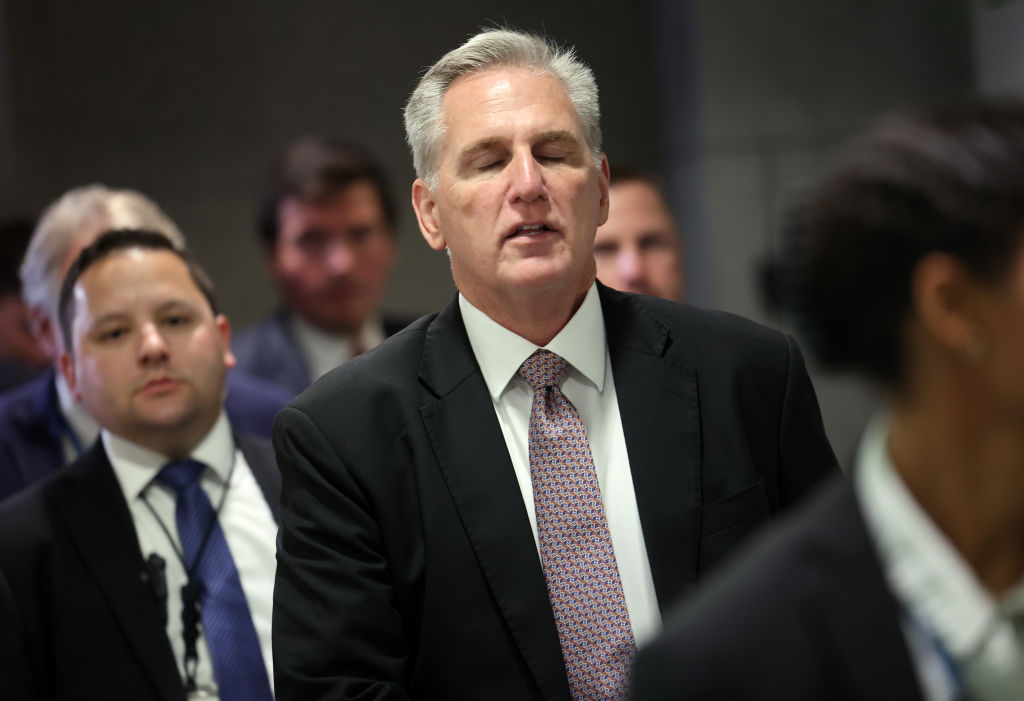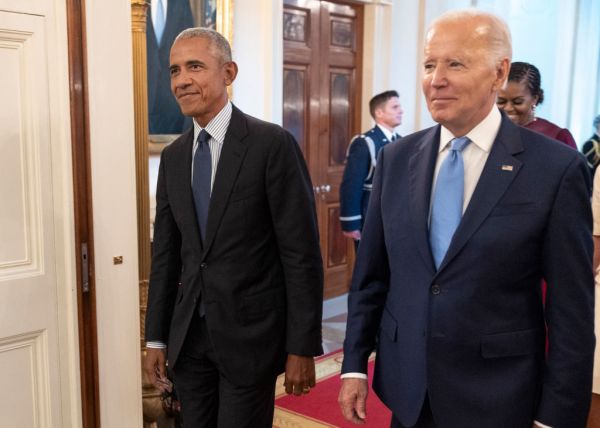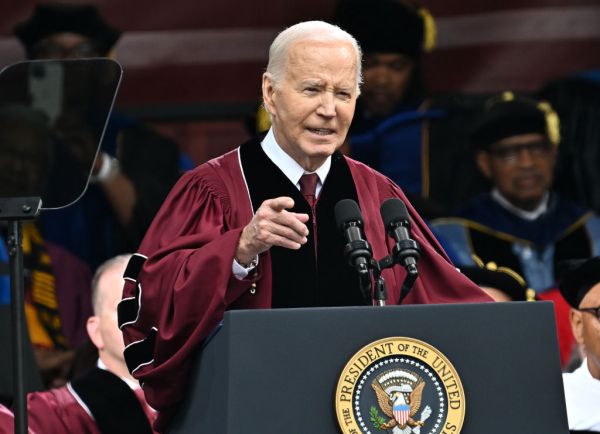Dysfunction in the House of Representatives hit a fever pitch Thursday, as a handful of hardline Republicans—for the second time since Tuesday—unexpectedly tanked consideration of a defense appropriations bill for fiscal year 2024. An exasperated House Speaker Kevin McCarthy sent the rank-and-file home for the weekend and began another round of closed-door negotiations with members of his own party to avert a government shutdown, a prospect that looks increasingly bleak.
“This is a whole new concept of individuals that just want to burn the whole place down,” he told reporters after the vote.
Obstructionist politics is hardly new. But the GOP’s slim governing margin means the smallest of minorities can stop House business. Before this session of Congress began in January, a vote on a rule—a procedural move to open debate on a bill—had not failed since 2002 under Speaker Dennis Hastert. With the two failed votes this week, McCarthy has now had three this year.
The first, in June, saw 11 conservatives vote against a rule for a bill that would have banned the Biden administration from regulating natural-gas burning stoves. Though the bill was a Republican messaging victory, the group tanked it to express dissatisfaction over the deal McCarthy had cut with the administration to raise the debt ceiling.
Defense appropriations bills are usually easy lifts for the GOP conference and pass with huge bipartisan support. This one would have allowed McCarthy to make good on his promise to pass all 12 government funding bills individually, which he made to Republicans earlier this year.
But McCarthy’s critics voting against the rule on Tuesday also indicated the more controversial continuing resolution (CR) to temporarily fund the government and avoid a shutdown—at least the version previously negotiated with some GOP hardliners—had no chance either.
McCarthy thought he had the votes Thursday after two previous holdouts agreed to play ball. But then two others, Rep. Marjorie Taylor Greene and Rep. Eli Crane, flipped their votes to no, joining GOP Reps. Andy Biggs, Dan Bishop, and Matt Rosendale.
Republicans were rankled. “We are very dysfunctional,” Rep. Tim Burchett said. “Speaker Pelosi, love her or hate her, she put something out there, and they’d rally around it.” McCarthy’s team “obviously can’t count,” he added.
Other House Freedom Caucus members criticized their colleagues for voting against the rule.
“I don’t agree with that, that’s completely counterproductive. Bring it to the floor, and then you can vote against it on the floor,” Rep. Wesley Hunt, a Texas Republican, said. He added that he will “always vote yes on the rule.”
After the failed vote Thursday, a few lawmakers huddled in McCarthy’s or Majority Whip Tom Emmer’s office to continue talks. Emmer’s office advised members that while the House is in recess until Tuesday, they should remain “on call” as discussions continue. But by late Thursday afternoon, lawmakers had already caught flights back to their districts.
The Dispatch asked one of the lawmakers who stayed to negotiate, Rep. Marc Molinaro, if he thought the CR was dead. “I’ve stopped thinking,” he quipped before heading into Emmer’s office.
McCarthy’s latest plan is for lawmakers to vote next week on up to four individual 2024 appropriations bills, which would theoretically appease the hardliners, then pivot back to a CR to keep the government open. “I bet we get [a CR] next week,” Rep. Don Bacon told The Dispatch.
One key demand from hardliners has been that Congress pass spending bills on an individual basis, consistent with a promise McCarthy made to win the speakership in January. But when they’ve moved to consider the bills individually, as happened twice this week with the defense bill, hardliners have revolted anyway because: They want 2024 appropriations to be written to 2022 fiscal year funding levels, around $1.47 trillion, which would be $120 billion less than what Biden and McCarthy agreed to in May during debt ceiling negotiations.
“The House has really abandoned the McCarthy CR strategy today and has embraced the Matt Gaetz strategy of single subject spending bills,” Rep. Matt Gaetz, McCarthy’s most stalwart GOP critic, crowed Thursday.
The Rules Committee met Friday to prepare a new rule for votes on four appropriations bills: the Department of Defense bill, the Department of Homeland Security bill, the bill for the Department of State, Foreign Operations, and related programs, the bill for the Department of Agriculture, the Food and Drug Administration, and related agencies. These bills were already approved by committees earlier this year, but now their topline spending numbers will likely be reduced even further to satisfy the Republican hardliners. These modified versions have no chance of passing the Senate.
Meanwhile, Senate Majority Leader Chuck Schumer has begun to take matters into his own hands, and is in talks with Senate Minority Leader Mitch McConnell to cut a deal on a CR and avoid a shutdown. On Thursday, Schumer moved on a bill that could be used as a vehicle for a CR. The bill originally was a reauthorization of the Federal Aviation Administration (FAA) passed by the lower chamber in July. Schumer’s move to file cloture—thereby capping debate on a bill to 30 hours—tees up a procedural vote in the Senate on Tuesday evening. It needs 60 votes to pass.
“As I have said for months, we must work in a bipartisan fashion to keep our government open, avoid a shutdown, and avoid inflicting unnecessary pain on the American people,” Schumer said on the Senate floor. “This action will give the Senate the option to do just that.”
Schumer’s optimistic rhetoric aside, the Senate has had its own challenges passing fiscal year 2024 legislation. It was unable to advance a minibus—a package bundling three appropriations bills—before leaving town for the weekend. The bill itself would not have averted a shutdown, but it would have put the Senate farther along than the House on passing spending bills.
The path of bipartisanship is also open in the House—but it could be a risk to McCarthy’s position. Some mainstream Republican members have proposed working on a CR with Democrats. Others have said they might go around McCarthy by signing a discharge petition, which would force a vote on the floor if a majority of lawmakers support it. But that wouldn’t come in time to prevent a shutdown; a discharge petition must be in committee for 30 working days.
So far, McCarthy is doing everything he can to avoid crossing the aisle to ask for Democratic votes, fearful his Republican critics would move to oust him as speaker.
But since the members giving McCarthy the hardest time are a small minority of his own conference, eventually putting together a deal with Democrats—who control the Senate and the White House—is inevitable.
“Any final bill is going to be bipartisan,” Rep. Mike Lawler, a New York Republican who represents a Biden-won district and has proposed going the discharge petition route, told reporters. “If somebody doesn’t realize that they’re truly clueless.”
Divided Congress, Divided Welcome for Zelensky
The House and Senate’s divergent receptions of Ukrainian President Volodymyr Zelensky provided quite the contrast.
Nearly all 100 senators—Democratic and Republican—attended a private meeting with Zelensky on Thursday. Zelensky received two standing ovations and thanked senators for the United States’ support to his country. He also provided an update on Ukraine’s defensive war with Russia. Shortly afterward, Senate Minority Leader Mitch McConnell issued a press release reiterating his support for Ukraine.
Meanwhile, just hours after Zelensky’s arrival, House GOP leadership was considering whether to strip a Pentagon funding bill of $300 million in aid to Ukraine in the midst of the funding fight.
This came after a much smaller meeting Thursday morning with Zelensky that included House Speaker Kevin McCarthy, Minority Leader Hakeem Jeffries, and some committee chairs. Zelensky had asked to address a joint address of Congress, which McCarthy declined.
McCarthy also waived off a White House offer for a classified briefing on the war. Senators, on the other hand, met Wednesday night with a group that included Director of National Intelligence Avril Haines, CIA Director Bill Burns, Secretary of State Antony Blinken, Defense Secretary Lloyd Austin, and Joint Chiefs of Staff Chair Gen. Mark Milley.
Despite the colder reception in Washington, Zelensky signaled satisfaction with the meetings, even with McCarthy. The Ukrainian president told reporters McCarthy “said they will be on our side.”
Military Blockade Lifts … An Inch
The Senate confirmed the promotions of three generals this week after monthslong gridlock due to Sen. Tommy Tuberville’s hold on military promotions in protest of the Pentagon’s abortion policy.
Senators approved Air Force Gen. Charles Brown to succeed Milley, along with Marine Corps Gen. Eric Smith, and Army Gen. Randy George to become leaders of their respective branches.
Ironically, Tuberville was the one who jumpstarted the process. His hold has prevented the Senate from confirming the promotions via unanimous consent, a way to fast-track Senate business if no individual senator objects. Schumer could have brought the promotions up for individual floor votes—which would eat up valuable time—but he refused because he didn’t want to incentivize others to use Tuberville’s tactic. But, feeling pressure from Democrats and fellow Republicans alike, Tuberville issued a minority cloture petition, a rare move that allows members to begin debate if they get signatories from 16 other lawmakers.
Republicans characterized the move as Schumer folding. “Schumer blinked and we’ve now had three confirmations,” Sen. John Barrasso told reporters.
But Democrats say holding floor votes for the more than 300 officers Tuberville’s hold affects isn’t going to happen. “Add them up. All the time required for each individual nominee, while others are arriving on the calendar, makes this physically impossible to do by the end of the calendar year,” Sen. Dick Durbin told reporters.
Tuberville’s office said he still has no plans to lift the hold.








